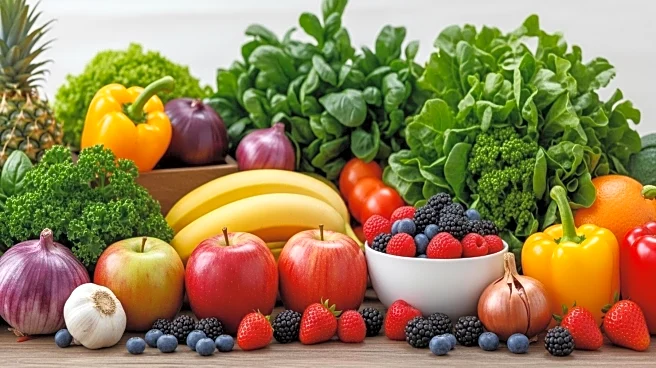What is the story about?
What's Happening?
Walmart has announced its commitment to remove synthetic dyes from its private-label food and drink ranges sold in the United States. This initiative is part of a broader effort to align with evolving consumer preferences and promote a more transparent food system. The company plans to eliminate artificial colorings from its Great Value, Marketside, Freshness Guaranteed, and Bettergoods brands by January 2027. Currently, 90% of Walmart's private-label food products are already free of synthetic dyes. In addition to removing synthetic dyes, Walmart has pledged to eliminate 30 other ingredients, including certain preservatives, artificial sweeteners, and fat substitutes. This move is in response to consumer demand for products made with simpler, more familiar ingredients.
Why It's Important?
The decision by Walmart to remove synthetic dyes and other ingredients from its private-label products reflects a significant shift in the food industry towards greater transparency and healthier options. This change is likely to influence other major food manufacturers to follow suit, potentially leading to widespread reformulation of food products across the industry. As consumers become more conscious of food ingredients, companies that adapt to these preferences may gain a competitive edge. The initiative also supports public health goals, as reducing artificial additives can contribute to healthier dietary choices. This move aligns with the Make America Healthy Again campaign, which aims to improve food quality and safety.
What's Next?
Walmart's reformulation program is expected to begin yielding results for consumers in the coming months. The company will collaborate with its private-label suppliers to adjust formulations and source alternative ingredients. The U.S. Food and Drug Administration (FDA) is also actively involved, having announced plans to ban certain food colorings and phase out petroleum-based synthetic dyes by the end of 2026. As Walmart and other companies implement these changes, consumers can anticipate more transparent labeling and healthier food options. The FDA's ongoing commentary on industry pledges will likely continue to influence corporate strategies in the food sector.
Beyond the Headlines
The removal of synthetic dyes and other additives from food products raises important ethical and cultural considerations. As consumers demand greater transparency, companies are challenged to balance cost-effective production with the need for healthier ingredients. This shift may also lead to increased scrutiny of food labeling practices and the ethical implications of marketing strategies. Additionally, the move towards cleaner labels could influence cultural perceptions of food quality and safety, potentially reshaping consumer expectations and industry standards in the long term.
















